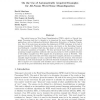Free Online Productivity Tools
i2Speak
i2Symbol
i2OCR
iTex2Img
iWeb2Print
iWeb2Shot
i2Type
iPdf2Split
iPdf2Merge
i2Bopomofo
i2Arabic
i2Style
i2Image
i2PDF
iLatex2Rtf
Sci2ools
123
click to vote
JAIR
2008
2008
On the Use of Automatically Acquired Examples for All-Nouns Word Sense Disambiguation
This article focuses on Word Sense Disambiguation (WSD), which is a Natural Language Processing task that is thought to be important for many Language Technology applications, such as Information Retrieval, Information Extraction, or Machine Translation. One of the main issues preventing the deployment of WSD technology is the lack of training examples for Machine Learning systems, also known as the Knowledge Acquisition Bottleneck. A method which has been shown to work for small samples of words is the automatic acquisition of examples. We have previously shown that one of the most promising example acquisition methods scales up and produces a freely available database of 150 million examples from Web snippets for all polysemous nouns in WordNet. This paper focuses on the issues that arise when using those examples, all alone or in addition to manually tagged examples, to train a supervised WSD system for all nouns. The extensive evaluation on both lexical-sample and all-words Sensev...
JAIR 2008 | Knowledge Acquisition Bottleneck | Language Technology Applications | Word Sense Disambiguation |
Related Content
| Added | 12 Dec 2010 |
| Updated | 12 Dec 2010 |
| Type | Journal |
| Year | 2008 |
| Where | JAIR |
| Authors | David Martínez, Oier Lopez de Lacalle, Eneko Agirre |
Comments (0)

